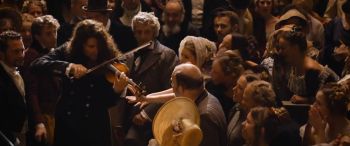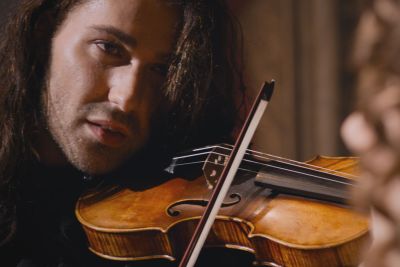By Jude Warne.
Bernard Rose is a firm believer of the interrelations of film and music. Music always seems to have been central to his approach to cinematic style. Rose got his start in filmmaking directing music videos such as UB40’s 1983 hit “Red Red Wine” and Frankie Goes to Hollywood’s hit “Relax” of the same year, before making Immortal Beloved (1994), with Gary Oldman starring as Beethoven.
Now in his latest release The Devil’s Violinist, Rose tackles the story of famed nineteenth century violinist Niccolò Paganini (played by superstar violinist David Garrett) and his colorful life in and out of the musical sphere. Most of the film’s action is centered on Paganini’s London tour of 1830. The virtuoso’s manager Urbani (Jared Harris) becomes enraged when Paganini falls in love (for real, this time – heretofore it has just been temporary lustful conquests) with showman John Watson’s daughter Charlotte, and goes forth to destroy the romance, continuing to manipulate Paganini as he sees fit. Rose’s artistic choices throughout the production led to an overall look and feel of musical authenticity in the world of the film’s story.
In conversation with writer-director Bernard Rose, we find out more about The Devil’s Violinist’s influences and its authentic treatment of nineteenth century music, the ever-relevant quest for fame and artistic immortality, and the life of one of music history’s most beloved geniuses.
How did this project come to be? Did you approach David Garrett before writing the screenplay, or was it more collaborative? Have you always been a Paganini fan?
 The production company wanted to make a vehicle for David Garrett, and I began outlining the story for The Devil’s Violinist.
The production company wanted to make a vehicle for David Garrett, and I began outlining the story for The Devil’s Violinist.
What was the source material? Did you enjoy the research process, coming across previously unknown stories or anecdotes about Paganini’s life perhaps?
I did a great deal of research on the origins of Paganini’s celebrity, and I came across an equal amount of positive and negative reviews of his work from the time in which he was alive and performing. Paganini was at his most in-demand and powerful in 1830 at the time of his London tour and the press covered it in detail. The London Times was selling over one million copies a day and newspapers were very powerful back then. The archives of these publications still exist, and their content on Paganini says a lot about the nature of celebrity and the press’ role within it. Paganini’s name still has resonance today, even though there are no photographs of him and no recordings of his work. His legacy in terms of content is thin.
What’s your take on this recurring idea of brilliant artists having sold their souls to the devil, like Paganini and Robert Johnson? It always seems to go hand in hand with a hedonistic lifestyle, explaining away their eccentricities or wildness with a magical or supernatural force. Do you think that it adds to their mystique, their legend?
It started with Paganini; he was the first Robert Johnson figure, the recurring figure that eventually transferred over from violin to guitar. The 1830s were the beginning of the Romantic era, when the most popular story at the time Goethe’s Faust, so it was a current idea in the consciousness of the general population. It was also the beginning of the Industrial era’s technological advances. The virtuosity of the violin, of everything, was seen as evil creeping into the world through science and extraordinary artistic talent. This is found in Mary Shelley’s Frankenstein as well. We’ve retained a lot of this, of fear and adoration of technology, as seen in Kubrick’s 2001: A Space Odyssey. Image-wise, there are a lot of old drawings of the devil with stringed instruments, which transferred from Paganini to guitarists in the twentieth century.
You’re a classical pianist – how did that influence or help your direction of the extraordinary violin performance scenes in this film?
 With my musical knowledge, with anyone’s, in this film’s musical sequences, there would have to be real players. I was rigorous about that. Andrea Deck, who played the role of vocalist Charlotte, sang with her real voice; Christian McKay, who played the role of showman and conductor John Watson, played the actual piano when needed and was able to make his conducting look believable. The orchestra featured in the film was made up of real musicians as well. Seeing instruments played incorrectly on screen drives real musicians in a film’s audience insane.
With my musical knowledge, with anyone’s, in this film’s musical sequences, there would have to be real players. I was rigorous about that. Andrea Deck, who played the role of vocalist Charlotte, sang with her real voice; Christian McKay, who played the role of showman and conductor John Watson, played the actual piano when needed and was able to make his conducting look believable. The orchestra featured in the film was made up of real musicians as well. Seeing instruments played incorrectly on screen drives real musicians in a film’s audience insane.
How did you find it working with first time actor David Garrett? Compared to say, the more experienced actor Gary Oldman in your Beethoven biopic Immortal Beloved?
An actor’s job is to create a character and bring him to life. David identified greatly with Paganini and what he was. He knew a lot about the lifestyle of a celebrity in the classical music world. Garrett made performing Paganini true. In the Klaus Kinski film Paganini (1989), Paganini didn’t sell with Kinski’s performance. He looked ridiculous, like he didn’t know how to play the violin.
What is the attraction of music and film for you, what do you feel visuals lend to music’s aurality? Did this begin before your ventures into music video direction? Music is often used in film, providing more poetry or mood perhaps, but the effect is slightly different when it plays a central role in the story’s plot.
Film and music have always been connected since the silent era, you don’t watch silent films without accompaniment. In terms of synchronicity in film, sound and film will always be in sync because the mind of the viewer makes these connections. It is a powerful tool; few films have no music at all.
What are your favorite films that use music well, or favorite film soundtracks?
In terms of classical music, I would say Ken Russell’s The Music Lovers. Viewing this film helped me to understand Tchaikovsky’s life and music profoundly, as it was a passionate film that depicted the composer struggling with his homosexuality. The motivation for his intense composing then became that much clearer. The film matched. Also the use of music in Kubrick’s films Barry Lyndon, 2001: A Space Odyssey, and Clockwork Orange with the early synthesizer, in which music was used in a particularly subversive way in many scenes, especially that of Beethoven’s 9th Symphony.
What is your next project? More music-related material?
I just completed my adaptation of Frankenstein. It’s an unusual adaptation in that it takes place in present-day Los Angeles and is told entirely from the point-of-view of the Monster.
What do you think of music nowadays?
There are so many people out there doing interesting things with music now. I always love Philip Glass’ work, and he’s actually done some soundtracks for me.
Would you do another biopic?
I believe that a biopic should be a story that would also work without the person being famous. You have to find out the angle, it needs a hook – so what if it’s just a life?
Jude Warne is a Film International ‘In the Field’ writer.

